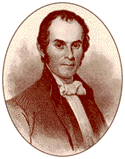John Greenleaf Whittier was an extraordinary American who lived in tumultuous times, putting his life on the front lines in the battle for equality and freedom for all people.
 Born in Haverhill, MA on December 17, 1807, John Greenleaf Whittier spent his early years living on a working farm with his parents, two sisters, a brother, a maternal aunt and paternal uncle. He was mostly self taught. He attended school only twelve weeks each year and as a young adult, received one year at the Haverhill Academy. There was no money available for additional education.
Born in Haverhill, MA on December 17, 1807, John Greenleaf Whittier spent his early years living on a working farm with his parents, two sisters, a brother, a maternal aunt and paternal uncle. He was mostly self taught. He attended school only twelve weeks each year and as a young adult, received one year at the Haverhill Academy. There was no money available for additional education.
Portrait of John Greenleaf Whittier as Editor
Whittier and his family – mother Abigail, sister Elizabeth and Aunt Mercy – moved to Amesbury MA in 1836 into a three-room cottage across the street from the Quaker Meeting House. He left the family homestead and began his early career as an editor. His first work was editorial engagements with the Haverhill Gazette, then to Hartford in 1830 as editor of New England Weekly Review, back to Haverhill, then editor of American Manufacturer in Boston, and later with the Pennsylvania Freeman in Philadelphia. Although his assignments were often hampered and short lived by his wretched health, Whittier’s editorial experiences served him well, widening his sphere of acquaintances, increasing his self-confidence, acquiring firsthand knowledge of local conditions and sharpening his perceptions of human behavior.
Portrait of John Greenleaf Whittier as Politician
His editorial work became a natural segue into his becoming an astute politician. The political skills that he most utilized were his tireless engagement in personal persuasion, secret and prolific correspondence and fighting fire with fire. He was willing to compromise on nonessentials for the sake of bringing things to fruition. Always, underneath all questions of policy lay his inherited democratic sympathy with the ordinary man. In 1831, Whittier was chosen as a Delegate to National Republican Convention to support Henry Clay. In 1834 he was elected to the Massachusetts House of Representatives. During the winter in 1835, he served in the Massachusetts State Legislature. It was only a matter of time before the talented Mr. Whittier would be called upon to involve himself in the nation’s divisive furore, the institution of slavery.
Portrait of John Greenleaf Whittier as Abolitionist
In March 1833, Whittier received a letter from William Lloyd Garrison. “My brother, there are upwards of two-million of our countrymen who are doomed to the most horrible servitude which ever cursed our race and blackened the page of history…..Whittier enlist! Your talents, zeal, influence — all are needed.” Whittier answered the summons and joined the Abolitionist Movement — what we now know as the first civil rights movement in the nation’s history.
Churches, colleges and courts were all against the Abolitionists, who were considered dangerous members of society. Many stated that the Abolitionists preached anarchy in the name of humanity. Whittier, trained to quiet activism, nonresistance, and respect for law, and skilled in feeling the pulse of public opinion, knew perfectly well what company he was keeping. To be an active abolitionist was to join the outcasts. The cause was dangerous.
Portrait of John Greenleaf Whittier as Poet
Whittier, known as The Quaker Poet, The Slave Poet and The Fireside Poet, wrote from the time he was a child until the close of his life in 1892. See this site on his poetry for details.
His first published work occurred in his youth when his sister, Mary Whittier, sent his poem The Exile’s Departure to William Garrison, publisher of The Free Press. Garrison thereafter published a Whittier poem every week in this newspaper.
The cause of Negro emancipation stirred and deepened Whittier’s whole nature. His poetry was prolific during this time. Slave poems and many of Whittier’s political poems remain to this day powerful, intense and very stirring.
By the end of the Civil War all the women of his family had died, leaving Whittier lonely and alone in his Amesbury house. It is from his personal grief, coupled with the nation’s grief that he wrote his masterpiece, Snowbound. An exhausted war-weary nation embraced the poem and Whittier, once the Abolitionist outcast, became a hero.
Snowbound, a poem about memory of family and of a heartfelt time that had gone by, was written with such clarity that you feel and know that you too were sitting around that fire, warm and safe, while the winter storm raged outside. It was the first time in his life Whittier received national recognition for his work as a poet accompanied by a substantial amount of money.
